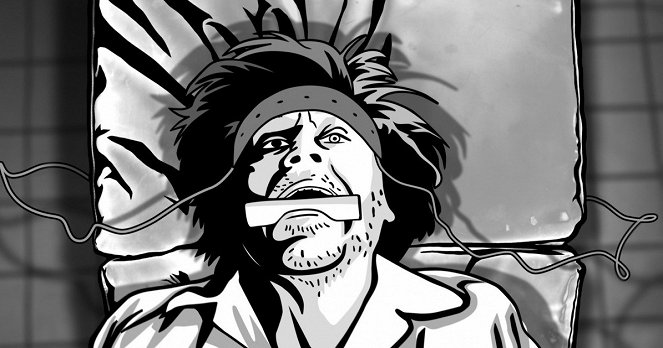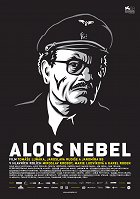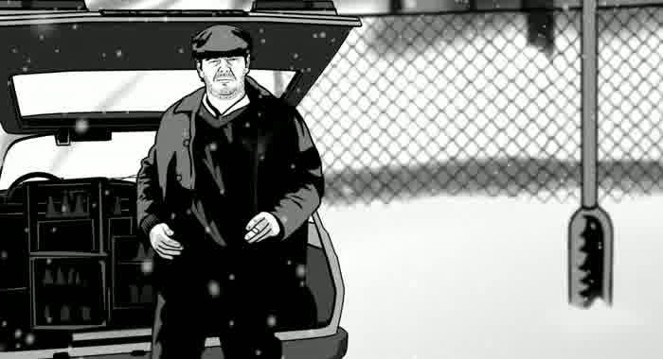Directed by:
Tomáš LuňákCinematography:
Jan Baset StřítežskýCast:
Miroslav Krobot, Marie Ludvíková, Karel Roden, Leoš Noha, Alois Švehlík, Tereza Ramba, Ján Sedal, Miloslav Maršálek, Jiří Štrébl, Marek Daniel, Klára Melíšková (more)Plots(1)
The feature film Alois Nebel is an adaptation of the graphic novel written by Jaroslav Rudiš and Jaromír 99 which combines animation and live-action. Directed by Tomáš Luňák the film will be made in co-production of Negativ (Czech Republic), Tobogang (Slovakia) and Pallas Film (Germany). The authors have chosen rotoscoping in order to keep the visual style of the original comic book. Each scene of the film will be shot with actors on location or in the studio and then redrawn and animated. Alois Nebel will be the first Czech film using this unique technology. The release of the film is planned for October 2011. (official distributor synopsis)
(more)Videos (4)
Reviews (8)
Comic book adaptations come in many different forms. 1) Literally at the risk of not succeeding with anyone but fans of the source material (Watchmen); 2) Literally entertainingly, with a stellar cast and in such a way that you don't actually need to know the comic book (Sin City); 3) "Disrespectfully" by ripping out a few of the most appealing lines from the source material, which comic book fans will hate you for (From Hell)... And there is a fourth way, which is actually the same as the last one, but the effect is completely different - while the fans of the comic book will lie at your feet, the Czech mass audience, for whom you simplified everything, will not care about you. And this is the case of Alois Nebel. The creators of this great comic book really trimmed the living organism of (its) comic book to the max and filmed with only a skeleton left. But the skeleton is still nimble, still has something to say and plays out (un)pleasantly suggestive human fates on the screen(s). At one point it focuses on trauma, then wades into the black waters of utter hopelessness, from where it emerges into the light, which, however, may not always shine. As far as I'm concerned, I say that everything important that the comic says, the movie says. My only regret is the short runtime. If it had been twenty minutes longer, it would have carried a lot more of the ash cargo.__P.S. And yes, it looks great.
()
A film that pretends to have a script, but is just a sort of existential character study that is more another foggy Jesenice hill than anything else. The form triumphs, and it makes it all too clear that it’s about the atmosphere – otherwise I can't explain why the corridor of the sanitarium is still in the shot nearly 10 seconds after one of the characters has passed through it. However, it was clear to me from the start that I wanted to see the film live-action, in color, and shot on roughly the same material as Wolf's Hole, where that atmosphere would be on full display. Otherwise, the horribly overheated trend of throwing singing songs into the film to "enhance" a scene is really in poor taste here. And someone kill Muchow, his "melancholy" strumming is making my adrenaline boil. P.S.: the orderlies in the madhouse were funny -) PPS: the comic is about ten times more atmospheric
()
What is the best thing about "Alois Nebel"? I want to say that it is the song "Půlnoční" by Václav Neckář. There is a lot of talk about this film, mainly because of the animation, which is incredibly well-crafted, but I have to admit that I don't feel like watching it in the cinema. It makes my head spin a bit. However, I acknowledge that it takes courage and determination to create something so demanding. In this aspect, "Alois Nebel" did not disappoint. What is an absolute disappointment is the rest of the film, mainly the story. The performances are good. Miroslav Krobot employs absolute minimalism for his role, but people will remember Leoš Noha as Wachek, who is a perfect example of a cunning Czech, who would do anything to improve his situation. Alois Švehlík also plays brilliantly. But what do they play? "Alois Nebel" basically has no plot, but it is a collection of interconnected scenes, which are linked by the character of Alois Nebel and his fate. There are flashbacks, there are episodes, but everything is just a demonstration of what a similar film with a proper story could look like. It is just another example of our alibism. We give it a great form, which should be enough. It's not enough. It simply isn't enough. More: http://www.filmovy-denik.cz/2012/07/happy-feet-2-bobr-cislo-4-musketyri.html
()
I could argue that the very unresolved relationships between the characters, and thus the incoherent tangles of their motivations, are the director’s intent, but I doubt that Negativ would pump $80 million crowns into a technically courageous animated film whose target audience can only be found in art house movie theaters.
()
Over the past decade of Czech cinema - or rather its entire post-November existence - I have taken a diplomatically reserved attitude because only a small number of films fall within the average, let alone exceed it in any way. Therefore, even Alois Nebel was not enticing to me, even though it was nominated for an Oscar because the responses to this film were conflicting. However, in the end, it tempted me to go to the movie theater, something I do with Czech films only once a year. Honestly, I do not regret it in any way because Nebel was a very pleasant surprise for me - after a long time, a Czech film has appeared that deliberately builds an atmosphere, has polished form, is not excessive, and affects the viewer, as cinema should, primarily through the image on the movie screen. It would greatly surprise me if it were to win an Oscar, although I believe that in many respects it surpasses famous animated films of the recent past. Waltz with Bashir excels in terms of animation style, and Persepolis excels in terms of visual design. However, Nebel is unfortunate because it takes place on the periphery of world events, and its creative duo does not make its protagonists' motives and actions clear enough to be understood on a global scale, and they are appreciated more by domestic, at most Central European, audiences. Waltz with Bashir dealt with nothing less than war and crimes against humanity, and Persepolis dealt with the globally known religious revolution in Iran. The few percent of the population capable of understanding such themes and who could be considered potential viewers can find their way to those films much easier than to the minimalist, intimate film Alois Nebel. Targeting the community of American academics would mean stretching the story of an entire decade into the past, showing the fates of the heroes of a small train station, the Sudetenland's cession, the expulsion of Czech inhabitants, some partisan sabotage, a Wehrmacht military operation, cattle trains heading to Auschwitz, and later the movement of heavy military equipment on rails during the 1968 occupation, and thus it would need to have a longer, let's say two-hour runtime. The resulting film would certainly be more epic and would contain themes that are understandable even overseas. But even in this version, Alois Nebel is an excellent choice for Czech viewers, even though the authors sometimes take a somewhat looser approach to interpreting recent history. In the autumn of 1989, the Polish border guards were certainly not engaged in frantic pursuit of defectors across the border, and the Polish state security certainly had different concerns and tasks than dealing with saboteurs. The downfall of the Polish regime came somewhat earlier and in a different way than that of the Czechs. Alois Nebel is an intimate yet raw film, where the viewer can often only guess at the dramas playing out behind the bearded faces and shining glances of individual characters. The inaccessible wilderness and dark border forests, flooded rivers and forest giants also play their role. The cast is excellent, with each actor precisely matching the characters' personalities. Overall impression: 95%.
()
(less)
(more)
Gallery (33)
Photo © Aerofilms



Ads